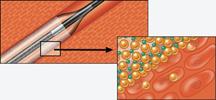May 4, 2010 – A deal has been struck to produce a generic version of Merck & Company’s Zetia (ezetimibe). In the United States, the cholesterol modifying agent has annual U.S. sales of about $1.4 billion, according to IMS Health data.
May 3, 2010 – Two new ambulatory electrocardiogram (ECG) devices are being introduced this week to help speed diagnostics and workflow. Midmark Corp. and Mortara partnered to create the systems.
May 3, 2010 – Excellent safety and clinical outcomes were shown in patients ages 70 and older who received a stent using endothelial progenitor cell capture technology. The stent accelerates the natural healing process of the vessel wall after stent implantation.
Cardiac PET/CT represents a major advancement in cardiovascular diagnostics, offering significant clinical and ...
May 3, 2010 – A point-of-care ultrasound system for use by emergency medical services (EMS) is being developed in collaboration between SonoSite Inc. and Physio-Control Inc. Under the terms of the agreement, the Physio-Control sales organization will assist in introducing SonoSite’s products to the EMS market.

Several paclitaxel drug-eluting balloons (DEBs) are currently available on the European market, and several others are in development. There are currently no DEBs available in the United States.

Drug-eluting balloons (DEBs) may offer new options in treating peripheral vessels and restenosis. DEBs already offer an alternative treatment tool in Europe, and the first DEB clinical trial in the United States is expected to begin later this year.
SPONSORED CONTENT — Studycast is a comprehensive imaging workflow system that allows healthcare professionals to work ...

In recent years, many medical device companies saw the underserved lower extremity as an opportunity to enter the market for peripheral artery disease (PAD) treatments. For this reason, device innovation and clinical trials in this segment have been robust.
April 29, 2010 - Merge Healthcare announced today it completed the acquisition of Amicas Inc., in which Merge purchased all of the outstanding shares of Amicas common stock for $6.05 per share. To finance the transaction, Merge placed $200 million senior secured notes due 2015, and completed a private placement of preferred and common stock of $41.75 million.
April 28, 2010 - A national "CT Dose Summit" will bring together leading experts on medical imaging to lay the foundation for establishing guidelines for performing computed tomography (CT) scans.
Providing exceptional cardiovascular care for patients to achieve the best possible outcomes is the number one goal for ...
April 28, 2010 - Molecular imaging can help physicians identify aortic dissection and help guide treatment, according to research published in the May issue of The Journal of Nuclear Medicine.
April 28, 2010 – Deviating from its focus on intravascular imaging systems and fractional flow reserve (FFR) catheters, Volcano Corp. said yesterday it entered into a Japanese distribution agreement with AngioScore for its AngioSculpt PTCA scoring balloon catheter. This is the first of what Volcano believes will be many products distributed by Volcano Japan.
April 28. 2010 – A trial examining the use of an orbital atherectomy device on calcified coronary lesions was granted U.S. Food and Drug Administration (FDA) unconditional approval this week.
Cardiac positron emission tomography (PET) is growing in popularity among cardiologists because it provides the ability ...
April 28, 2010 – A Web-based platform designed to share electrocardiogram (ECG) information between emergency medical services (EMS) and hospitals now connects 12-lead devices from various manufacturers.
April 28, 2010 – About 280,000 external defibrillators used worldwide in health care facilities and public places may malfunction during attempts to rescue people in sudden cardiac arrest, the U.S. Food and Drug Administration (FDA) warned this week.
The Society for Cardiovascular Angiography and Interventions’ (SCAI) upcoming 33rd Annual Scientific Sessions promises the latest news in interventional cardiology from leading experts in the field. The event will take place May 5-8 in San Diego.

 May 04, 2010
May 04, 2010












